If you’re welding, then safety gear is of paramount important. One of the things that you NEED is a welding helmet to protect your eyes from the arc. The UV rays that are emitted from the arc can cause serious problems with your eyesight if you don’t wear a helmet.
We’ve listed our top 10 welding helmets on the market today at a range of prices. All of these welding helmets are auto-darkening, which are our favorite type of welding helmet. Auto-darkening means that the lens does not have a fix shade and you can keep it on for different welding processes. The sensors in the helmet will automatically increase or lower the shade of the lens depending on the welding process, so they’re much more versatile. We’ve also written a buyers guide to show you how we chose our top 10 which you can see below to help you choose the perfect welding helmet for you needs.
- Best all-round welding helmet
- Best welding helmet under $100
- Best welding helmet under $200
- Best welding helmet for the money
- Most comfortable welding helmet
- Clearest welding helmet
Contents
Best Welding Helmet Comparison Chart
| Helmet | Image | Lens Area | Oz | Sensors | Optic Class | Price | Rating | More |
|---|---|---|---|---|---|---|---|---|
Lincoln Electric 3350 | 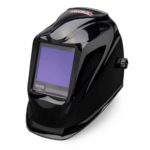 | 3.74″ x 3.34″ | 21 | 4 | 1/1/1/1 | $$$ | 4.7/5 | |
| 3M Speedglass 9100 | 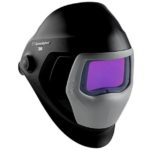 | 4.2″ x 2.8″ | 21 | 3 | 1/1/1/2 | $$$$ | 4.7/5 | |
| Esab SENTINEL A50 | 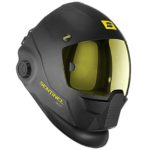 | 3.93″ x 2.36″ | 22.5 | 4 | 1/1/1/2 | $$$ | 4.7/5 | |
| Miller Digital Infinity | 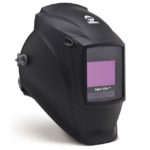 | 13.4″² | 23 | 4 | 1/1/1/2 | $$$ | 4.6/5 | |
| Optrel Crystal 2.0 | 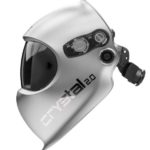 | 4.5" x 2" | 17 | 3 | 1/1/1/2 | $$$ | 4.5/5 | |
YESWELDER M800HP 10% Discount Code: KINGSWELDING | 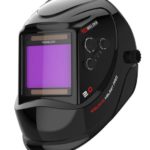 | 3.93″ x 3.66″ | 37 | 4 | 1/1/1/2 | $ | 4.5/5 | |
| Antra AH6-260-0000 | 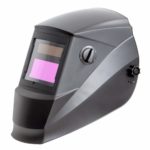 | 3.86″x 1.73″ | 15 | 4 | 1/1/1/2 | $ | 4.5/5 | |
| YESWELDER Panoramic 10% Discount Code: KINGSWELDING | 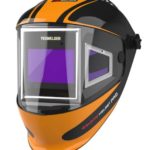 | 3.94″ x 2.64″ | 30.3 | 6 | 1/1/1/1 | $$ | 4.5/5 | |
| Hobart Inventor | 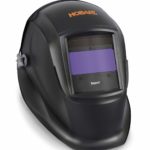 | 3.94″ x 2.36″ | 19.7 | 4 | 1/1/1/1 | $$ | 4.5/5 | |
| DEKOPRO | 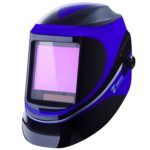 | 3.85’’ x 3.15’ | 32.5 | 4 | 1/1/1/2 | $ | 4.5/5 |
10 Best Auto-Darkening Welding Helmets
Below is our list of our top 10 welding helmets on the market today.
1. Lincoln Electric Viking 3350
![]() Best all-round welding helmet
Best all-round welding helmet
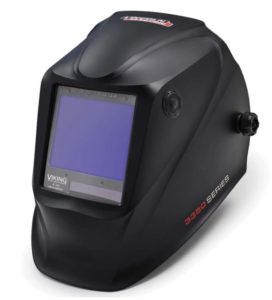 |
|
Our favorite welding helmet is the Lincoln Electric Viking 3350. This professional welding helmet balances comfort and exceptional clarity at an affordable price. The optical clarity really stands out, it’s a perfect 1/1/1/1 and it features 4C lens technology to create a true color view. The lens is continuously variable for shades 5-13 and features an external grind button to quickly switch between weld and grind mode.
This doesn’t have the curvature and wide field of view some other helmets, but it makes up for this with a taller viewing area that gives it a huge overall window size (12.5 square inches) that’s amazing for seeing directly what’s in front of you. This combined with a super fast lens reaction time and 4 arc sensors makes for great visuals.
It’s also comfortable and lightweight helmet. The headgear distributes weight across six contact points to eliminate discomfort and pressure on the head. There’s lots of adjustment points if you need them to ensure you get the most comfortable fit possible.
The 3350 is also available in loads of different custom designs including Stars and Stripes, Steampunk and Zombie.
|
Specifications
|
Pros
Cons
|
2. 3M Speedglass 9100XXi Welding Helmet
![]() Most comfortable welding helmet
Most comfortable welding helmet
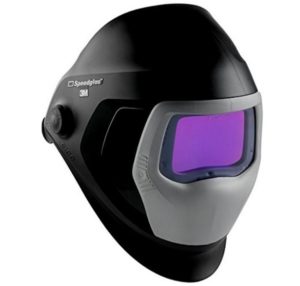 |
|
There’s no doubt this is one of the best welding helmets on the market, it’s comfortable, clear, stylish and has a large viewing area.
The visibility when wearing this helmet is top drawer. There is excellent clarity and the viewing screen is large with side windows to give you added peripheral vision. If you’re working in a busy environment, having added visibility of your surroundings can be a big factor. The helmet’s mounting system also brings you close to the lens to help maximise your visibility. It has variable dark shades 5, 8 and 9-13 and a light shade 3 with external button
The Speedglass 9100XXi has also been designed for comfort. It’s lightweight and has two adjustable head straps to keep it secure, along with a padded headband and a swivel mounted smooth ratchet system. The design self-adjusts to your head shape so you don’t need to tighten it as much. Finally, there is additional ventilation on the side which allows your breath to be removed from the hood and fumes don’t enter the hood. This is great for reducing fog and makes it a lot less stuffy in there, perfect if you’re welding for longer periods of time. It’s the most expensive helmet on our list, but you get what you pay for.
|
Specifications
|
Pros
Cons
|
3. Esab Sentinel A50
![]() Coolest design
Coolest design
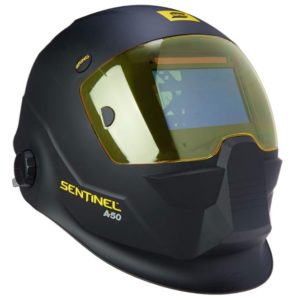 |
|
This futuristic looking helmet offers excellent clarity with a true color lens that gives a blueish arc color. You can really see more when wearing this helmet.
On the top of the helmet is the external grind mode button (shade 4) which is useful for changing between processes. There’s also unique touchscreen display on the inside to change between different shades, sensitivity, delay and save settings for different processes. I do like this feature but it might be tricky to operate with big hands and gloves.
It’s really comfortable to wear with an adjustable 5 point head gear to help you fit it to your head shape and you can easily replace the lens on the front in just a few seconds. The curvature of the lens helps to increase the field of vision, however, the lens is prone to warping on hot processes. Don’t put your face too close to the weld, if you’re TIG welding or on thin stainless then you should be fine. ESAB do offer an alternative high heat cover if you’re concerned about warping. The design and the clarity is really what steals the show here, as well as being extremely comfortable with lots of adjustability.
|
Specifications
|
Pros
Cons
|
4. Miller Digital Infinity
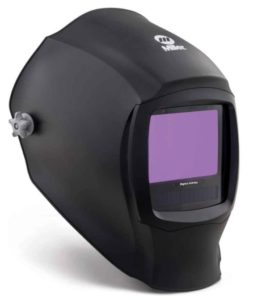 |
|
The main two Miller helmets on the market are the Miller Digital Infinity and the Digital Elite. The biggest difference between these two helmets is the viewing area. The Infinity has a huge 13.4″² viewing area, while the Elite has just 9.22″², a huge difference which is why it gets the nod. The Elite is lighter at just 18oz, but with the Infinity being 23oz you still wouldn’t class it as a heavy helmet.
The visibility on this helmet is outstanding, with ClearLight Lens technology to reduce the green and give true color vision at 1/1/1/2 optical class. The digital buttons are large and easy to use, and the are some cool design features. There is an X-Mode option which means the arc is sensed electromagnetically, so you won’t have sunlight interference and the arc is detected even the the sensors are blocked.
The headgear is OK but could’ve been better designed for comfort for the price. It has a padded head cushion with adjustability that’s designed to be ergonomic, but it’s not as comfortable as we’d hope for. Overall this is a great helmet that gives excellent visibility and you know will be reliable and responsive.
|
Specifications
|
Pros
Cons
|
5. Optrel Crystal 2.0
![]() Clearest welding helmet
Clearest welding helmet
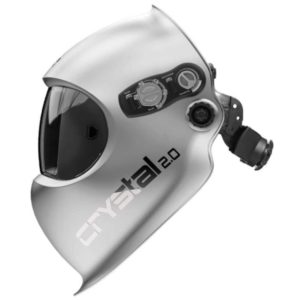 |
|
The Optrel Crystal 2.0 is a popular welding helmet that is unmatched when it comes to clarity through the lens. The name “crystal” comes from the crystal clear visibility, which is designed to be like a window pane so you can see all the fine details of the weld pool, making it perfect if you’re laying intricate TIG welds.
It’s comfortable to wear for long periods because it’s so lightweight at just 17oz, the head gear is OK but nothing to write home about. The viewing area is quite small but the small size of the helmet brings it close to your nose and the shape actually allows you to see quite a lot even compared to helmets with larger viewing areas.
|
Specifications
|
Pros
Cons
|
6. YESWELDER M800HP
![]() Best for the money
Best for the money ![]() Best under $100
Best under $100
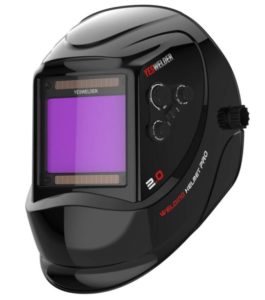 |
|
10% off coupon code on Yeswelder: KINGSWELDING
Our best bang for your buck welding helmet is this from YESWELDER. Straight away you can see the huge front viewing area which gives great visibility. The lens does amazing on the color for the price, with close-to-true color view that minimizes green coloring. It also has 4 sensors which you don’t find too often at this price. It’s adjustable between shades 5 and 13, with a grind mode and controls on the side for quick adjustments while wearing gloves.
The build quality of these things isn’t amazing, they don’t have the reliability of a Lincoln or 3M, the straps aren’t that strong and bolts have been known to come loose. That being said, most people do have a good experience and the lens is top quality so you’ve still got amazing visibility at a great price. This helmet is also available in a range of cool custom designs on the YESWELDER website.
|
Specifications
|
Pros
Cons
|
7. Antra AH6-260-0000
![]() Best budget welding helmet
Best budget welding helmet
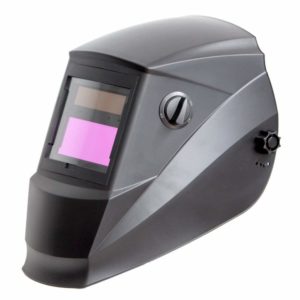 |
|
The Antra Welding Helmet must be the most popular welding helmet on the market and is the cheapest on our list. It’s lightweight, versatile and ticks a lot of boxes in terms of quality, with a good optical class, lens reaction time and 5-13 shade range. The clarity and color is pretty good and the arc has a green tint. It also now has a grind mode and adjustable sensitivity options.
It’s so lightweight that it’s great for welding for long periods of time, it’s also adjustable for extra comfort. It’s not the best choice for durability so I wouldn’t use this for heavy welding applications or if you need something hardwearing. The main downside of this is the small viewing area. The viewing area is still ok but it’s about half the size of the Lincoln 3350. Overall the AH6-260 is an excellent welding helmet for the price and a perfect choice for beginner welders or hobbyists looking for a bargain.
|
Specifications
|
Pros
Cons
|
8. YESWELDER EH-302C Panoramic 180 View
![]() Best welding helmet under $200
Best welding helmet under $200
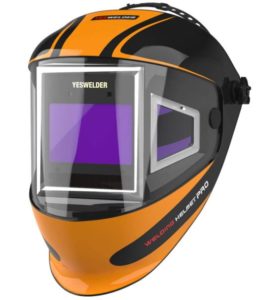 |
|
10% off coupon code on Yeswelder: KINGSWELDING
What immediately stands out about the YESWELDER EH-302C is it’s amazing panoramic view. It not only has a large front screen, but two more auto-darkening screens on the side which darken independently in response to light. The additional peripheral vision is a nice feature for repositioning whilst leaving the hood down.
The clarity in this is also great, it has true color technology so help further improve visibility. If you want great visibility when welding, it’s hard to look past this helmet. It has 6 sensors total, with 4 on the front.
The head gear it pretty comfortable, there’s a cushioned pad to rest against forehead with adjustable tension. As for durability, we’re yet to see how reliable this is. We don’t expect it to have a durability of some other brands, but you get great features with this at an affordable price and it’s available in some cool designs on the YESWELDER website.
|
Specifications
|
Pros
Cons
|
9. Hobart 770890 Inventor
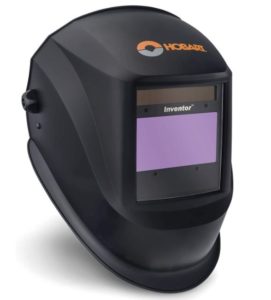 |
|
The Hobart Inventor is a good welding helmet that’s not much more expensive than YESWELDER, but you get the added durability and reliability of a Hobart product. The optical class is a perfect 1/1/1/1 and it has 4 sensors, the color does have a greenish tint but it’s perfectly responsive and the clarity is good.
It’s lightweight so it’s great for wearing for long periods of time. The headgear is also comfortable with different adjustability settings and a padded headband. There is a grind mode and the controls are analogue on the inside of the helmet, so you will need to flip the hood up to change. If you want something on a budget that’s a bit more reliable, this Hobart welding helmet is well worth looking at.
|
Specifications
|
Pros
Cons
|
10. DEKOPRO Auto Darkening
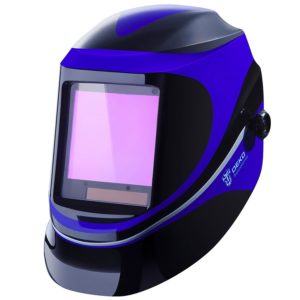 |
|
This helmet from DEKOPRO is another auto-darkening helmet with a nice large viewing area that’s available at a great price. It’s a similar price to the YESWELDER, however the YESWELDER has a slightly larger field of view and external buttons which are easy to use. This is a bit lighter at 32.5oz, but it’s still pretty heavy.
It’s a good choice for beginners and we can’t really knock it. The comfort and durability can leave a bit to be desired, but at the price it’s a good helmet.
|
Specifications
|
Pros
Cons
|
How to Choose a Welding Helmet
There’s a lot of different options when choosing an auto darkening welding helmet. Many look similar but have different specifications and it can be hard to understand the differences in price. Factors such as viewing area size, sensors and optical class are all things to consider. We’ve outlined the key things to consider when choosing a helmet and how we chose our top 10 auto darkening welding helmets on the market today.
Helmet Weight & Comfort
If you’re wearing your welding helmet for several hours at a time, the weight of the helmet will be an important factor. Heavier welding helmets will add more strain on your neck and can become quite painful, even if it doesn’t feel that heavy when you first put it on. Lighter helmets can also reduce the chance of stress injury over time if you’re wearing the helmet for very long periods. Comfort is general is worth considering here, if you get a lightweight, padded helmet then the chances are you’ll enjoy welding more due to your comfort. Look for one that fits securely round your head. A helmet that you can’t fit tightly will move around and will distract you when welding and will need to be adjusted.
Viewing Area
Viewing area size can be very important if you’re regularly welding out of position or require visibility over a wider area. Some helmets have a longer and some have a wider viewing area, anything near 4″ x 3″ would be considered a large viewing area and 3.5″ x 1.75″ a small viewing area. I prefer helmets with a viewing area taller than 2 inches, but it all comes down to personal preference and the project you’re working on. If you’re working in an area with restricted space, you’ll want the largest viewing area possible because it will be hard to keep adjusting your body to see clearly.
Air fed
Some welding helmets are connected to a clean air supply via a tube. These air-fed systems are known as PAPR welding helmets They offer more protection from welding fumes than simply wearing a respirator under the welding helmet and are much better for your safety when welding fumes are present, particularly in low-ventilated areas.
Optical Class
All auto-darkening welding helmet lenses are tested and rated for quality and given an optical class. This corresponds to the clarity of vision through the glass. Auto darkening lenses are evaluated in four clarity categories and given four numbers that are graded either 1, 2 or 3, with 1 being the best. Hence, the best optical rating is 1/1/1/1. The difference between a 1/1/1/1 and a 1/2/1/2 isn’t great, but an experienced welder will immediately notice the change in clarity of the workpiece.
Arc Sensors
The number of arc sensors in an auto darkening welding helmet is something to consider when choosing a helmet. Sensors detect flashes while you work and darken the helmet in a fraction of a second to protect your eyes. Generally, the less expensive ones will have two or less sensors and the more advanced models three or four. Having two sensors can work fine, but it increases the risk of not catching the flash if you’re welding out of position. Having four sensors helps to decrease the risk of the helmet failing to catch a flash that may arise by having sensors obstructed by objects such as pipes.
Helmet Power Source
Welding helmets are either powered by solar power, lithium batteries, or both combined. Generally a combination of the two is the best option because this allows you to extend the battery life of your welding helmet and means if one power source runs out you can still rely on the other one.
If your welding helmet uses batteries, the main thing to consider is if the power source is replaceable or not. Welding helmets that just use replaceable batteries are good because you can attach the batteries and use the helmet right away. However, you’ll always need to have replacement sets of batteries with you. If your welding helmet relies on solar power, this can be cost effective as you don’t need to worry about replacing batteries. A useful feature you get on most good auto darkening helmets is called auto-off. This helps to automatically turn the power off to save your battery life.
Sensitivity Control
Most auto-darkening welding helmets provide the ability to set the minimum brightness value that triggers the darkening. This manual option is useful if you’re welding at low amperage where you may need increased sensitivity. It’s also good if you’re working an environment where there are other welders and lots of arcs. Here you can increase the decrease the sensitivity so it’s not being triggered by other people’s arcs.
Lens Shade Options
An auto-darkening welding helmet lens will provide a range of shades. The more shades you have then the more flexible you can with be with applications. If you’re constantly changing settings and processes then you’ll benefit from a range of shade options. A 9-13 shade is normal, but if you’re working on low amperages where it’s harder to see the arc then a 6-13 shade is a good option.
Lens Reaction Time
The lens reaction time is the speed at which the lens changes from being light to becoming dark after the arc is started. The lenses will change in a fraction of a second, with the best professional lenses are rated up to 1/20,000 of a second. The more frequently you weld, the more important having a fast lens reaction time is. If you’re constantly starting arcs, then the slight increase of exposure to the arc time and time again can lead to eye fatigue, so you’ll want it the change to dark as quickly as possible. If your eyes still hurt after welding with a helmet on, this could be one of the reasons why.
Personalization
There are lots of different styles of welding helmet on the market with artwork to help show you personality There are many more different colors available instead of just the classic grey or black. You can also get graphic designs such as flags, eagles and flames, which are all popular styles of welding helmet that you’ll sometimes find as alternative color options when you select a helmet to buy such as YESWELDER. There are also quality helmets available from a range of brands, so if you like a particular brand such as Lincoln or Miller then you can stick with their stuff with confidence.
Safety Standards
ANSI standards require that welding helmets provide full and adequate protection to people wearing them. There is rigorous testing that a welding helmet has to pass to achieve ANSI national safety standards including protection from ultraviolet, infrared, impact and temperature. The current safety standards is ANSI Z87.1 – 2003, which is the standard you should purchase to help ensure safety.
Price
The price of welding helmets ranges from around $50 at the cheap end to around $800 at the high end. If you have a set budget in mind then this will obviously help your selection but generally the more expensive ones will be better helmets. We’ve listed a range of helmets to suit different budgets, ranging from the lower end right up to the high end. We feel that all the helmets we’ve included at a certain price range offer value and are the best available at that price range.

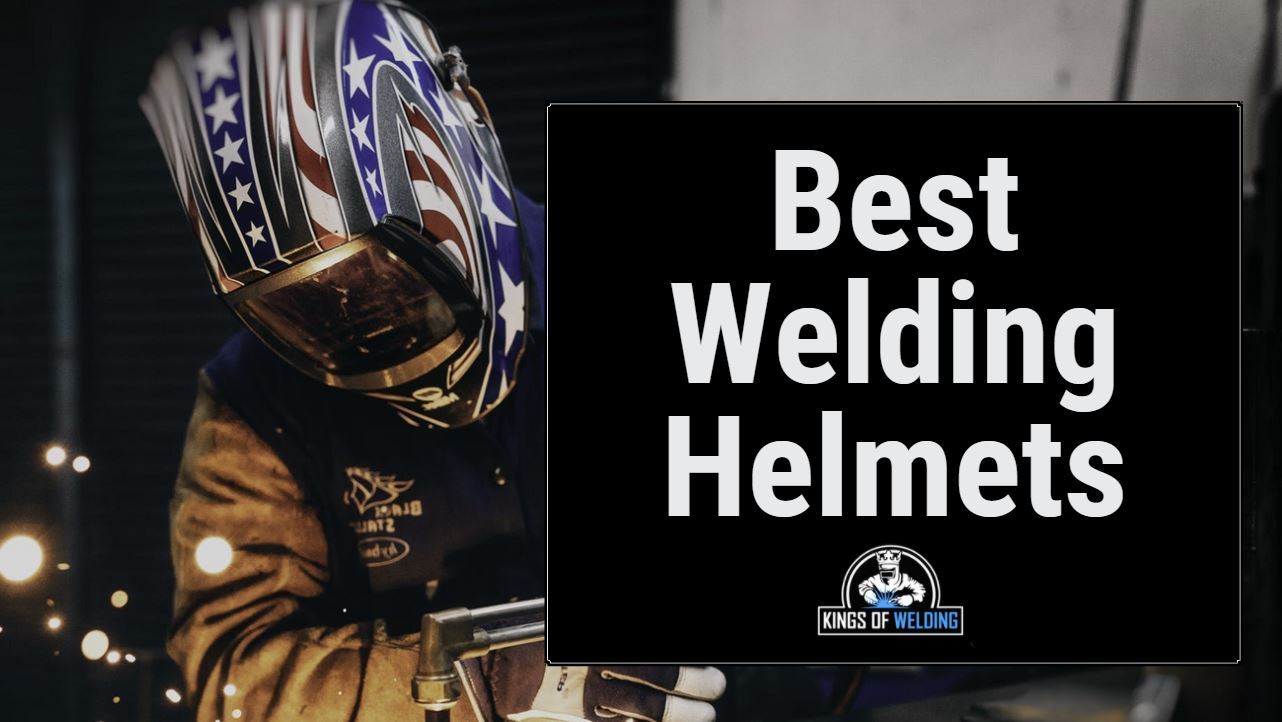
 (5.0 / 5)
(5.0 / 5) (4.5 / 5)
(4.5 / 5) (4.0 / 5)
(4.0 / 5) (4.7 / 5)
(4.7 / 5) (3.5 / 5)
(3.5 / 5) (4.6 / 5)
(4.6 / 5)
Unfortunately the review left out the Eastwood and Yeswelder welding helmets which are certainly better than a few/most of the products recommended. Please update.
Hi David,
For our hobbyist recommendations we prefer Yeswelder to Eastwood because they have a larger viewing area and are available at a better price. For regular use where weight and comfort is more important then we recommend one of our higher rated helmets.
Cheers,
John